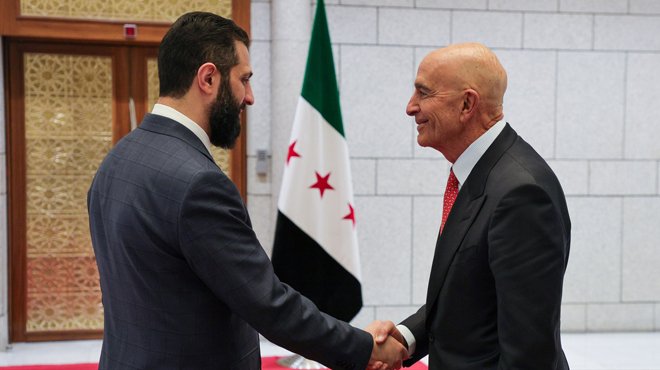Mazloum Abdi’s meeting with Ahmed al-Sharaa delayed as U.S. envoy seeks to resolve key differences

A widely anticipated meeting between Syrian Democratic Forces (SDF) commander Mazloum Abdi, Syrian President Ahmed al-Sharaa, and U.S. Special Envoy Tom Barrack in Damascus did not take place today. The cancellation signals unresolved differences between the parties, with U.S. officials now working to narrow gaps before a high-stakes trilateral meeting can occur.
Context: The U.S. envoy is currently meeting President al-Sharaa alone, without Abdi, despite earlier expectations of a joint session. Notably, there is no French representative present either, even though previous reports suggested that France would join the U.S. as a guarantor of the Abdi–Sharaa agreement signed in March. A delegation from northeast Syria is confirmed to be in Damascus, holding separate meetings with government officials.
Analysis: The absence of Mazloum Abdi from today’s meeting suggests lingering disputes over the implementation of the March agreement. U.S. envoy Tom Barrack’s meeting with al-Sharaa, which includes the American representative for northeast Syria, appears aimed at addressing these sticking points. If progress is made, Abdi could still travel to Damascus in the coming days for a joint session.
At stake is not only the future of the SDF as a military force, but also the broader shape of the post-conflict Syrian state. The SDF reportedly seeks to extend the timeline for implementing the agreement—which currently sets the end of this year as the deadline—while pushing for decentralization in northeast Syria and collective integration into the Syrian army. However, the Syrian government has so far rejected both demands. Damascus insists that SDF fighters must join individually and be absorbed into the national army structure, and it opposes any form of political autonomy. A source close to the government has, however, indicated a possible openness to limited administrative autonomy.
Another immediate point of contention involves the future of ISIS detainees currently held by the SDF. The U.S. is reportedly pushing for responsibility over the detention centers to be transferred to the Syrian government—an issue tightly linked to broader regional dynamics and the ongoing PKK disarmament process.
Today, in a historic video statement, jailed PKK leader Abdullah Öcalan declared that the disarmament decision is final and irreversible—underscoring that progress on the SDF agreement in Syria is essential, as both files are interconnected.
A further complication involves the territorial scope of any decentralization arrangement. While the SDF controls large Arab-majority areas, especially in Raqqa and Deir Ezzor, many local residents there have strong affiliations with Damascus’s new Sunni Arab-led government. Whether these areas will remain part of a decentralized zone—should decentralization proceed at all—is still unresolved.
Ultimately, a likely scenario may involve a reduced version of decentralization limited to Kurdish-majority areas, potentially excluding key Arab regions. This would result in a geographically fragmented autonomous region and may require separate arrangements for the SDF’s Kurdish and Arab components. Much will depend on U.S. policy decisions and ongoing coordination with Turkey, which is closely monitoring both the SDF’s fate and the PKK’s disarmament process across the border.









